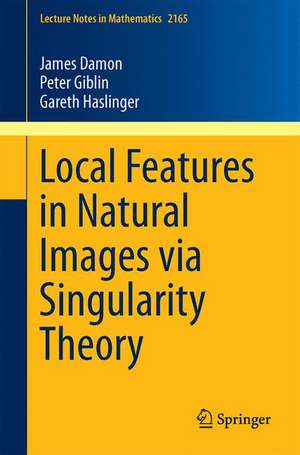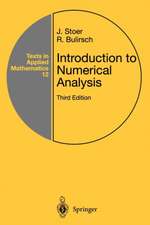Local Features in Natural Images via Singularity Theory: Lecture Notes in Mathematics, cartea 2165
Autor James Damon, Peter Giblin, Gareth Haslingeren Limba Engleză Paperback – oct 2016
Din seria Lecture Notes in Mathematics
- 17%
 Preț: 360.42 lei
Preț: 360.42 lei -
 Preț: 459.92 lei
Preț: 459.92 lei -
 Preț: 121.41 lei
Preț: 121.41 lei -
 Preț: 175.68 lei
Preț: 175.68 lei -
 Preț: 197.00 lei
Preț: 197.00 lei -
 Preț: 279.76 lei
Preț: 279.76 lei -
 Preț: 477.65 lei
Preț: 477.65 lei - 17%
 Preț: 361.88 lei
Preț: 361.88 lei -
 Preț: 252.37 lei
Preț: 252.37 lei -
 Preț: 353.99 lei
Preț: 353.99 lei -
 Preț: 138.88 lei
Preț: 138.88 lei -
 Preț: 152.61 lei
Preț: 152.61 lei -
 Preț: 116.67 lei
Preț: 116.67 lei -
 Preț: 102.77 lei
Preț: 102.77 lei - 17%
 Preț: 365.52 lei
Preț: 365.52 lei -
 Preț: 396.75 lei
Preț: 396.75 lei - 17%
 Preț: 362.12 lei
Preț: 362.12 lei -
 Preț: 396.11 lei
Preț: 396.11 lei -
 Preț: 357.78 lei
Preț: 357.78 lei - 17%
 Preț: 362.31 lei
Preț: 362.31 lei -
 Preț: 403.80 lei
Preț: 403.80 lei - 17%
 Preț: 361.70 lei
Preț: 361.70 lei -
 Preț: 499.87 lei
Preț: 499.87 lei -
 Preț: 457.03 lei
Preț: 457.03 lei -
 Preț: 395.90 lei
Preț: 395.90 lei -
 Preț: 459.00 lei
Preț: 459.00 lei -
 Preț: 487.57 lei
Preț: 487.57 lei -
 Preț: 424.01 lei
Preț: 424.01 lei -
 Preț: 487.57 lei
Preț: 487.57 lei -
 Preț: 330.55 lei
Preț: 330.55 lei -
 Preț: 325.75 lei
Preț: 325.75 lei -
 Preț: 350.30 lei
Preț: 350.30 lei -
 Preț: 331.31 lei
Preț: 331.31 lei -
 Preț: 408.37 lei
Preț: 408.37 lei -
 Preț: 328.25 lei
Preț: 328.25 lei -
 Preț: 421.28 lei
Preț: 421.28 lei -
 Preț: 276.08 lei
Preț: 276.08 lei -
 Preț: 424.60 lei
Preț: 424.60 lei -
 Preț: 422.05 lei
Preț: 422.05 lei -
 Preț: 505.01 lei
Preț: 505.01 lei -
 Preț: 422.05 lei
Preț: 422.05 lei -
 Preț: 274.93 lei
Preț: 274.93 lei -
 Preț: 335.16 lei
Preț: 335.16 lei -
 Preț: 422.27 lei
Preț: 422.27 lei -
 Preț: 497.49 lei
Preț: 497.49 lei -
 Preț: 272.81 lei
Preț: 272.81 lei -
 Preț: 428.04 lei
Preț: 428.04 lei -
 Preț: 376.22 lei
Preț: 376.22 lei -
 Preț: 427.10 lei
Preț: 427.10 lei -
 Preț: 325.92 lei
Preț: 325.92 lei
Preț: 386.61 lei
Nou
Puncte Express: 580
Preț estimativ în valută:
73.98€ • 77.40$ • 61.45£
73.98€ • 77.40$ • 61.45£
Carte tipărită la comandă
Livrare economică 02-16 aprilie
Preluare comenzi: 021 569.72.76
Specificații
ISBN-13: 9783319414706
ISBN-10: 3319414704
Pagini: 208
Ilustrații: X, 255 p. 107 illus., 50 illus. in color.
Dimensiuni: 155 x 235 x 14 mm
Greutate: 0.38 kg
Ediția:1st ed. 2016
Editura: Springer International Publishing
Colecția Springer
Seria Lecture Notes in Mathematics
Locul publicării:Cham, Switzerland
ISBN-10: 3319414704
Pagini: 208
Ilustrații: X, 255 p. 107 illus., 50 illus. in color.
Dimensiuni: 155 x 235 x 14 mm
Greutate: 0.38 kg
Ediția:1st ed. 2016
Editura: Springer International Publishing
Colecția Springer
Seria Lecture Notes in Mathematics
Locul publicării:Cham, Switzerland
Cuprins
Introduction.- Overview.- Part I-Mathematical Basis for Analysis of Feature-Shade/Shadow- Contours.- Abstract Classification of Singularities Preserving Features.- Singularity Equivalence Groups Capturing Interactions.- Methods for Classification of Singularities.- Methods for Topological Classification of Singularities.- Part II-The Classification of Interactions Involving Feature– Shade/Shadow–Contours.- Stratifications of Generically Illuminated Surfaces with Geometric Features.- Realizations of Abstract Mappings Representing Projection Singularities.- Statements of the Main Classification Results.- Part III-Classifications of Interactions of Pairs of Feature– Shade/Shadow–Contours.- Stable View Projections and Transitions involving Shade/Shadow Curves on a Smooth Surface (SC).- Transitions involving Views of Geometric Features (FC).- Part IV-Classifications of Multiple Interactions.- Transitions involving Geometric Features and Shade/Shadow Curves (SFC).- Classifications of Stable Multilocal Configurations and Their Generic Transitions.- Bibliography.
Textul de pe ultima copertă
This monograph considers a basic problem in the computer analysis of natural images, which are images of scenes involving multiple objects that are obtained by a camera lens or a viewer’s eye. The goal is to detect geometric features of objects in the image and to separate regions of the objects with distinct visual properties. When the scene is illuminated by a single principal light source, we further include the visual clues resulting from the interaction of the geometric features of objects, the shade/shadow regions on the objects, and the “apparent contours”. We do so by a mathematical analysis using a repertoire of methods in singularity theory. This is applied for generic light directions of both the “stable configurations” for these interactions, whose features remain unchanged under small viewer movement, and the generic changes which occur under changes of view directions. These may then be used to differentiate between objects and determine their shapes and positions.
Caracteristici
Includes geometric features of objects, shade/shadow features, and apparent contours Analyzes generic changes under viewer movement Amply illustrated with computer generated images Yields approach for edge detection where multiple curves meet Employs singularity theory on semi-analytic stratified spaces Combines singularity methods with geometry of surfaces Builds on earlier results in singularity theory and shows necessity of topological methods













